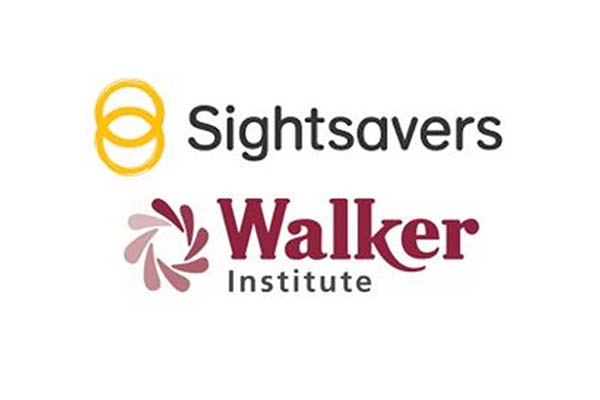
Climate information and neglected tropical diseases: supporting health systems to adapt to an uncertain climate
With the announcement of their new partnership, cemented by the signing of a Memorandum of Understanding, Sightsavers and the Walker Institute are looking forward to supporting policy makers and practitioners in addressing neglected tropical diseases (NTDs) more effectively against the backdrop of a changing climate.
Sightsavers, an international charity working to eliminate avoidable blindness and promote the rights of people with disabilities, and the University of Reading’s Walker Institute for climate resilient societies aim to close critical data gaps and synthesise evidence to generate new insights into the relationship between NTDs and climate change. This diverse group of largely preventable and/or treatable diseases are strongly associated with poverty and thrive in tropical areas. And whilst they affect more than one billion people, they are largely neglected in research, partly because they are typically a threat in low-resource settings.
Improving our understanding of how climate change influences NTDs however, can help identify populations at risk and can therefore improve systemic approaches to mitigating those risks.
The partnership will, crucially, facilitate a joined-up approach to government and institutions: improving the integration of climate information into health-related policies, planning and systems design as well as in disaster response planning. In addition, the partners will build the capacity of other key stakeholders, such as community-based health workers, to apply climate information in the context of NTDs for improved outcomes at the community level.
Identifying the most appropriate partners to join us in this collaboration is critical, and we welcome all enquiries about how to get involved. We seek partners with specific health, climate and/ or modelling expertise as well as funding partners who can support us in accelerating our work.
For both organisations, collaboration is central to tackling the challenges that sit at the nexus of climate change and health. Sightsavers is committed to the WHO 2030 roadmap and the Kigali Declaration, which focus on encouraging cross cutting-approaches, collaboration, and partnership around NTD transmission including the intersection between health and climate change. For the Walker Institute, the importance of working across sectors through an interdisciplinary approach is clear: building resilience against climate change requires multiple stakeholders to come together, ensuring that climate information is ‘fit for purpose’ and can be integrated effectively into decision-making for policy action. This is especially critical in the health sector, where the impacts of climate change on a range of diseases are not yet well understood.
Walker has previously engaged with a multi-sectoral analysis of climate, health and disaster management systems in Malawi and their readiness to respond to the potential health impact of climate events (https://walker.ac.uk/about-walker/news-events/walker-and-who-working-towards-an-integrated-health-and-climate-information-system-for-improved-readiness/). The project illustrated many of the problems and opportunities arising from the application of climate science in development, where the direct and indirect impacts of climate change are felt over a range of sectors and institutions. Both Sightsavers and the Walker Institute are committed to addressing these challenges through their partnership.
Together, Sightsavers and the Walker Institute have outlined the vision of their work together: optimising the skills, expertise, and experience that each brings but also keen to engage with additional partners to ensure the best possible outcomes.
The vision includes:
Monitoring the impact of climate change on human health;
Supporting national programmes’ awareness of climate change and its potential health impacts;
Working together, and with other appropriate NTD modelling partners, to review and update environmental suitability models for specific NTDs;
Modelling the risk of resurgences of specified NTDs based on environmental and climatic risk factors;
Developing tools and processes to support long-term monitoring of climate change affecting the transmission of NTDs.
We very much look forward to exploring ways of working together to ensure that health systems are fit for purpose as the impacts of climate change become ever more evident.
Walker Institute director Professor Rosalind Cornforth said: “This partnership with Sightsavers will improve our understanding of the links between various NTDs and climate, with regards to population displacement, human infection and entomological changes.
“NTDs disproportionately affect some of the most vulnerable people in the world and this is likely to be exacerbated by the climate emergency. We aim to improve regional and local climate change modelling to enable more reliable predictions of health impacts and allow better planning and decision-making for the people who are at most risk.”
Sightsavers technical director for NTDs Philip Downs said: “To treat, prevent and ultimately eliminate these diseases, we need different sectors to come together and play their part.
“By working with governments and the Walker Institute, we hope we can better understand how climate influences the spread of disease. This means that the communities who are affected by these diseases will be better prepared to mitigate the risks and continue to work towards NTD elimination.”
To find out more or get involved, please contact:
Sightsavers: Rebecca Keys rkeys@sightsavers.org; Ben Steele bsteele@sightsavers.org
Walker Institute: Prof Ros Cornforth, r.j.cornforth@reading.ac.uk; Pen Cabot p.a.cabot@reading.ac.uk;

